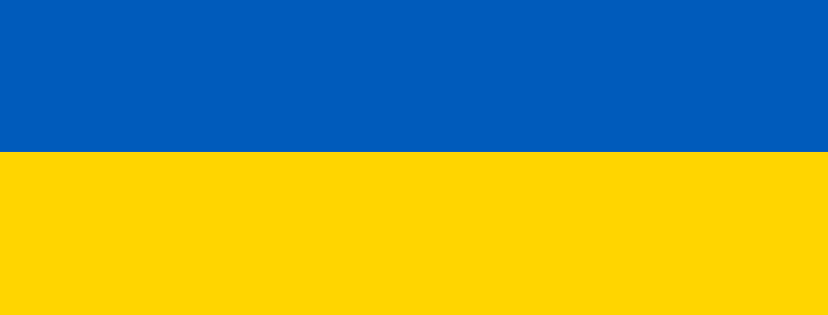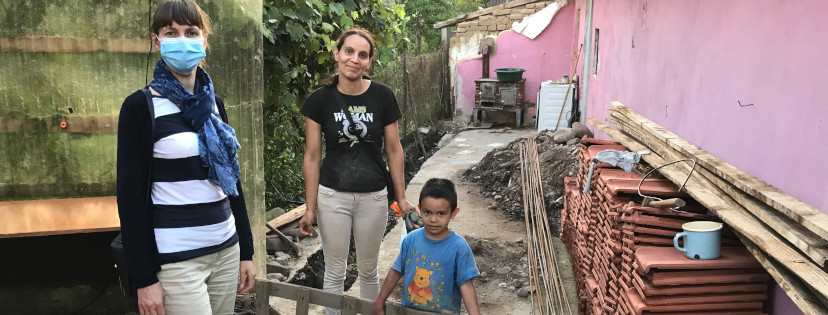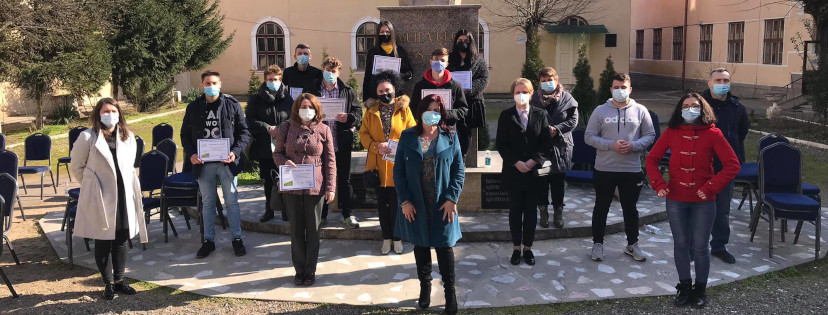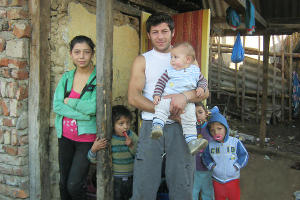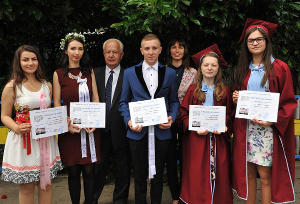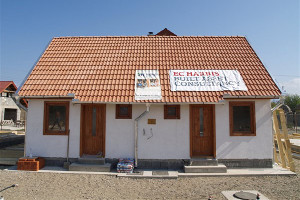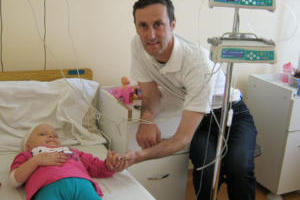
Postal address:
Good Samaritan Association
Str. Gheorghe Pitut, nr.11, bl.Z3, ap.2
Beius, 415200, Bihor,
Romania
Email: info@goodsamaritan.ro
Tel: +40 720 64 22 38
Website: www.goodsamaritan.ro
 Listed below are responses to the most frequently asked questions. Should you have any further questions, please don't hesitate to contact us.
Listed below are responses to the most frequently asked questions. Should you have any further questions, please don't hesitate to contact us.
- Why are there so many orphans in Romania?
- Where do the orphans come from?
- How many youngsters has Good Samaritan helped already?
- What is the average age of the youth in the program?
- What are the biggest barriers for youth who has been in orphanages from being successful?
- What is the education level of the youth?
- What kinds of jobs do the youth get after leaving the program?
- What can I do to help?
Why are there so many orphans in Romania?
Until 1989 Romania was a communist country ruled by the dictator Nicolae Ceausescu and the Romanian Communist Party. During his rule Ceausescu imposed harsh economic restrictions on us as Romanians causing poverty among many and massive restrictions on food. This fact, coupled with the poor spiritual condition and lack of community care in Romania, made abandoning one's children to the state-run orphanage system an easy solution for broken families. Sometimes the state proactively took children and institutionalized them. Under communism, abortions were outlawed. Ceausescu wanted large families in order to have a large work-force to produce goods for the mother land. Abortion is permitted since 1990 and now, that communism has fallen over 23 years ago, Romania went to another extreme with being first in the E.U. and 6th in the world regarding abortions per capita!
Another aspect of the problem of child abandonment in Romania is the Roma (or Gypsy) community. In the Roma culture girls marry at a young age. Because they begin early and because Roma girls are usually not sent to school often at all, some have as many as fifteen pregnancies over their lifespan! Not having possibilities to earn their bread (women do not work while men are undereducated and with less job opportunities), many beg or steal to survive. Many of the children are sick or die at a young age; others are abandoned at birth. Because of the poverty of most Gypsy families, they are incapable of caring for so many children and so, child abandonment and abortion are easy solutions. Around eighty percent of abandoned children in Romania are of Roma ethnicity.
Actually, many of the abandoned children in Romania are not orphans, they have parents. But their parents have decided to abandon them due to different reasons and thus have rejected them. Orphans, as well as any disadvantaged or disabled people are looked down upon and are not helped like they are helped in America or western European countries. Partially this is occurring because good practices to address these issues are still to be modeled in many places, and on the other hand, due to the unwillingness, fear or lack of knowledge to approach and accept the one who is different than them.
One of the most damaging things was that orphans in the big institutions grew up without role models or mentors or whatever supporting system. They went through their childhood unloved, unwanted and with few or no bond relationships. They were psychologically, emotionally, and physically abused. These children were taught little about life skills and then, when they finished school around eighteen years of age, (most would not know how to fill in a paper) they were forced to leave the orphanages.
Today, 24 years after the communism collapsed, the government still offers them very little help when they exit the institution. Unless people like you step in and help them, many would become outcasts of society. Almost none are capable of making it on their own. Having been taught nothing about money, a work ethic, how to find a job or a place to live, paying bills, manners or even simple hygiene, many cannot fend for themselves and become jobless and homeless. They beg and steal for food, become addicted to drugs and, worst of all, are lured into the underground world of prostitution and human trafficking.
Click here http://news.bbc.co.uk/2/hi/europe/4629589.stm to read an article on the BBC or read in Wikipedia about the issue of the Romanian orphans http://en.wikipedia.org/wiki/Romanian_orphans
Where do the orphans come from?
Primarily the youth we assist come from the state orphanage in Beius, Northwest Romania. Good Samaritan has also assisted youth from orphanages in Oradea or Popesti (Bihor County). Oradea is the county seat situated at 60 kilometers from Beius.
How many youngsters has Good Samaritan helped already?
We have helped already more than 200 young people and their children. Because of the hard one-on-one work that needs to be done with orphans, we are focusing not on the numbers but on the quality of the relationship with them. So we may never see huge numbers of orphans enrolling in our programs. We accept this is part of the success principles and we desire to work closely with the ones who God puts on our path, who are willing to accept the great endeavor and change their thinking and life-style no matter what it takes, putting behind the past. We work one-to-one, mentoring them intensely, teaching them how to get out of risky situations, building a new personality in them.
What is the average age of the youth in the program?
The average age of the youth is 25 years.
What are the biggest barriers for youth who has been in orphanages from being successful?
The barriers to success are many, including lack of family and support systems; communities and businesses that are often wary of accepting and hiring orphans; mental disabilities or behavior issues and limited skills for interacting with other people, particularly in work situations. Moreover, many of the orphans in Good Samaritan come from gypsy families and encounter much prejudice when they try to integrate into society.
What is the education level of the youth?
Most often the youth from the orphanages complete eight grades (elementary school) plus one and a half years of vocational school which aims supposedly to skill them as a painter, carpenter, electrician, etc. Very few are able to study in college or university. The majority of orphans know how to read, but few are able to do basic multiplying. On average, orphans from the state orphanage have an IQ between 70 and 90.
What kinds of jobs do the youth get after leaving the program?
Youth who leave the Good Samaritan programs usually find jobs at the local factories or companies such as construction or sewing companies, shoe/clothing manufacturers, carpentry shops, stores, etc. A few travel overseas for work once they get a little job experience in country.
What can I do to help?
There are a number of ways you can help the Romanian orphans to have a better chance in life, including financial assistance for improving or expanding the current programs, sponsoring a youngster for a year, volunteering or simply praying for the youth and spreading the word about their needs.
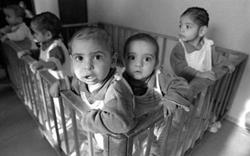 During the communist rule in Romania from 1948 until 1989, orphanages overflowed with children who were abandoned by families and individuals too poor to support them. Despite having a population of just 12,000 inhabitants, Beiuş’ orphanage in the 80’s housed up to 750 children. The orphans had difficult lives in the orphanages, receiving only basic food, inadequate clothes, limited education, and they were often beaten severely if complained.
During the communist rule in Romania from 1948 until 1989, orphanages overflowed with children who were abandoned by families and individuals too poor to support them. Despite having a population of just 12,000 inhabitants, Beiuş’ orphanage in the 80’s housed up to 750 children. The orphans had difficult lives in the orphanages, receiving only basic food, inadequate clothes, limited education, and they were often beaten severely if complained.
A young adult orphan girl named GH shares her experience in the orphanage: „It was like in a prison. I don’t even want to remember it. The food was very little. We were more than 30 people sleeping in the same room. There were kids at different ages accommodated together. Everything that was given to us from the teachers or educators was later taken by the older orphans. They used to beat us a lot, for just about everything.”
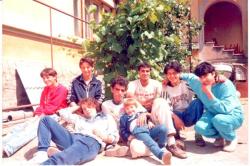 All the orphans waited for the day when they would turn 18, so they could leave the orphanage and start working in a job given to them by the government. After communism collapsed in Romania in 1989, the orphans were still forced to leave the orphanage when they turned 18, but the government no longer provided them with job assistance. As a result, the orphans often became homeless and wandered the streets without a job, a family or hope. Many were living in parks, under bridges, unfinished buildings, train stations, lives that led to stealing or prostitution.
All the orphans waited for the day when they would turn 18, so they could leave the orphanage and start working in a job given to them by the government. After communism collapsed in Romania in 1989, the orphans were still forced to leave the orphanage when they turned 18, but the government no longer provided them with job assistance. As a result, the orphans often became homeless and wandered the streets without a job, a family or hope. Many were living in parks, under bridges, unfinished buildings, train stations, lives that led to stealing or prostitution.
"When I was 18, I was put out of school. I had no money, no clothing, I owned nothing. I didn't know where to go. I slept in the train station of Beius for six months with other kids. I was hungry", remembers GH.
”I stayed on the streets for 5 years and slept under a bridge. In those days I wasn’t interested what my life would be like in the future. Winter caught me on the streets and because I did not want to sleep in cold I would stay in a bar. But in order to stay there I had to clean it up and help when the supplies would come. I did not receive anything; I could just stay there during the night. One day I got sick and had to go to hospital. After I came back they did not receive me in the bar anymore.”- shares GS.
A young Romanian man saw the plight of the orphans and decided to try and help them when it seemed no one else would. Initially, Adrian Ciorna and his mother opened their home for two girls and provided them with a bed, bathroom, food and most importantly love and acceptance. Adrian and his mother continued to open their home for more orphans and tried to assist them in finding work and a new life.
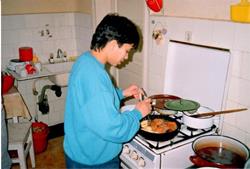 GH, one of the first two girls taken under Adrian’s care, remembers, “One day I and a group of other teenagers were asked to leave the orphanage on the next day. When we left, we didn’t have anything - neither clothes nor even a mattress to sleep on. The teachers didn’t offer us any advice as to what we were supposed to do. It was very hard. I stayed on the streets for about 2 months. I started working here and there taking small jobs, but didn’t have anywhere to sleep. There was a group of us living on the streets, staying together. This continued till I met LK, an orphan like me. He told me then: “Do you know the Ciorna family? Let me bring you to Mrs. Ciorna.” When we went there I received some money and could buy some food. On the second day after talking to Adrian I got accommodated in their house. Later Mother Maria taught me how to cook. I could stay there 2 years and could find a job.”
GH, one of the first two girls taken under Adrian’s care, remembers, “One day I and a group of other teenagers were asked to leave the orphanage on the next day. When we left, we didn’t have anything - neither clothes nor even a mattress to sleep on. The teachers didn’t offer us any advice as to what we were supposed to do. It was very hard. I stayed on the streets for about 2 months. I started working here and there taking small jobs, but didn’t have anywhere to sleep. There was a group of us living on the streets, staying together. This continued till I met LK, an orphan like me. He told me then: “Do you know the Ciorna family? Let me bring you to Mrs. Ciorna.” When we went there I received some money and could buy some food. On the second day after talking to Adrian I got accommodated in their house. Later Mother Maria taught me how to cook. I could stay there 2 years and could find a job.”
In 1993 Adrian Ciorna founded The Good Samaritan Association, a non-profit organization in his home town of Beiuş. “I learned a lot about their tough life, and God changed my world view - from focusing on my business career to serving people in need. Life was tough for these orphans: They were turned out on the streets at age 18, there was prejudice against hiring them, they were under-educated and had no life skills. I then founded a local orphan integration program with the goal of finding international sponsors for these young people to help support them while they learned life skills and established an employment history.”
In those years tens of youngsters were annually appealing for the help of the association.
“Soon, through part-time volunteer work as an interpreter, I learned of Habitat. I thought it was an amazing opportunity to help people help themselves. Even so, it was, for me, a dark day when I left my full-time work with the orphans to join Habitat as national coordinator in late 1995. I wondered, "What will happen with the orphans?" Until I had served the illiterate or blind, street kids or poor, the homeless and hopeless, I didn't know love's depth. In 1998, FS, an 18-year-old orphan, came to me. He said, "I know you use volunteers with Habitat, but give me some work as well. I need to survive." God opened the doors. Some of the orphans came to work on the Habitat site in a one-year employment opportunity. “
Since 1993 Good Samaritan has assisted more than 200 young adult orphans and their children in the cities of Beiuş, Oradea, Timisoara and Cluj. Turning 18 they were helped to learn a profession in one of four vocational programs (carpentry, construction, cooking and agriculture) and create an employment history, while jobs in those years were so limited. The street life for these and many others is behind them.
Today, Good Samaritan continues its mission of providing disadvantaged youngsters from state and private orphanages with the skills and opportunities to socially and professionally integrate into society, while showing them Christian love, care, support and Jesus Christ’s model for living extending its experience of so far 20 years to other communities too.
 Mission
Mission
Good Samaritan is a Christian organization that operates in Romania to assist disadvantaged young adults who grew up in orphanages and their families by:
- Providing material help that allows them to live a safe life that meets their basic needs
- Helping them capitalize on their abilities to move towards self-sufficiency
Good Samaritan is also working proactively in the community to break the cycle of child abandonment due to poverty.
Vision
To create a world where no more orphans from state and private orphanages are homeless, hungry, or lack the skills and opportunities to be integrated into society; where children are not abandoned but have safe family environment and the opportunities to develop their full potential, as God intended for them to be.
Values
The people of Good Samaritan are committed to following these guiding principles and values as they work to achieve their mission and vision:
- Demonstrate Christian love and compassion by following Christ's example in our daily actions
- Respect the youth and trust in their ability to change for the better and to progressively take on all the fundamental responsibilities of life.
- Act with professionalism, integrity and honesty, providing a model for the youth.
- Maintain a spirit of teamwork in the whole organization.






